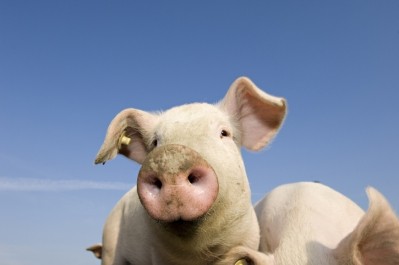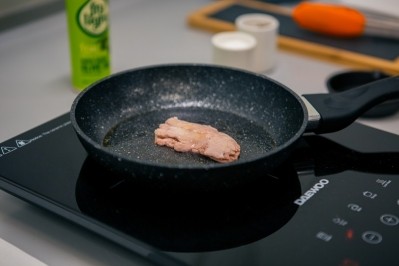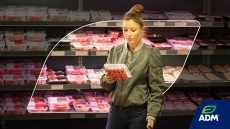Pork and microalgae cells combined in cultivated meat an ‘industry first’

It took ten weeks for Mewery’s scientific team – based in Brno, Czech Republic – to cultivate the prototype made up of 75% pork cells and 25% microalgae cells.
The result is completely ‘unique in the world’, according to the start-up, which claims it’s the first prototype of cultivated meat based on microalgae to ever be developed.
Combining two organisms into one product
Mewery was founded by Czech entrepreneur Roman Lauš in 2020. The name ‘Mewery’ – a completely new word – was inspired by other companies’ descriptions of cultivated meat, the founder explained.
“My partner Kristýna Kvardová [and I] were tired of companies explaining that cultivated meat is made in a sort of brewery, but not really. Thus, we created a new word combining ‘meat’ and ‘brewery’,” Lauš recalled, “which indicated the place where cultivated meat is produced.”
The start-up’s goal is to develop 100% cell-based products. As it stands, cultivated meat products on the market – as well as some cultivated meat prototypes developed for tastings – use cell-based ingredients combined with plant-based ingredients.
“It’s not a secret that cultivated meat products on the market are not only cell-based, but also made of plant proteins,” Lauš told FoodNavigator. “So what you are eating is plant protein with the addition of some cells cultured separately.”
What sets Mewery apart, we were told, is that Mewery’s scientific team is combining two organisms – microalgae and pork – in one product.

The company is developing a porcine cell line for a proprietary hybrid media, which doesn’t require foetal bovine serum (FBS) and is using a patent-pending microalgae platform for the media, growth factors, and scaffolds, the founder revealed.
The benefits of microalgae
According to Mewery, using microalgae helps reduce costs and delivers nutritional benefits.
FBS is notoriously expensive, so swapping out conventional growth media, as well as some other media components, with Mewery’s customised microalgae-based alternative ‘saves a lot of money’.
“We already have several variants of media that work for us without animal products and which we continue to work with,” said Lauš. “It’s like a cookbook. You have to add somewhere, take away somewhere else, and you will only find out if it was successful when you bake the cake. We have typed specific parameters that we track and compare their dependencies. It’s bioinformatics in practice.”
Benefits associated with microalgae are not limited to cost savings alone. According to Mewery, the microalgae itself enriches the product with nutritional benefits such as vitamins, antioxidants, minerals, fibre, and essential fatty acids.
Commercialisation strategy
Mewery is currently working on establishing its own biobank from which it can cultivated more meat products. “In this way, we want to ensure a more or less unlimited source of pig cells, which will move us closer to large-scale production,” said Lauš.
“The increase in the volume of cultivation in large-capacity cultivators is directly related to this and should happen already this year.”

The start-up’s roadmap includes cultivated minced meat, meatballs, and sausage products. In the longer-term, it will also include whole cuts. Mewery wants to have its first finished product on the market within two years, but being a novel food, it will need to obtain pre-market approval before reaching consumers’ plates.
“We are already talking to partners in Singapore and with the Singapore Food Agency (SFA),” the founder revealed. “Singapore is, so far, the furthest along in approving new types of food, especially cultivated meat.” Indeed, Singapore was the first country to grant regulatory approval to a cultivated meat product in late 2020.
“Close behind is the US Food and Drug Administration (FDA) and the USDA Food Safety and Inspection Service (FSIS) in America, where the final approval for the first cultivated chicken product to be launched on the US market is underway.”
Lauš predicts the European Union will take longer to approve cultivated meat products: “In my opinion, [it will be] at least two to three years before we see the first products in our shops.”
Mewery has its eye on Singapore, the US, and the EU for commercialisation and hopes to expand into other Asian countries in the longer term.
























